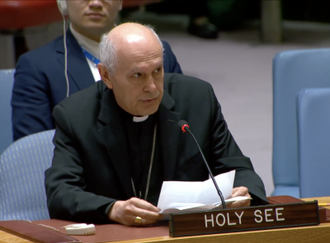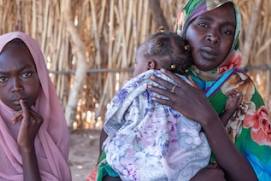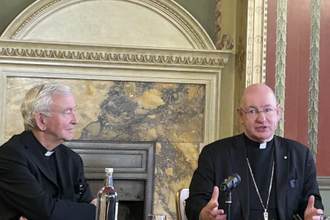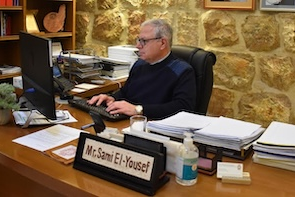Holy See urges effective protection of civilians in war zones

Archbishop Gabriele Caccia
Source: Holy See Mission to United Nations
Addressing an open debate in New York on the protection of civilians in armed conflict, Archbishop Gabriele Caccia, Permanent Observer of the Holy See to the United Nations has decried attacks on civilian infrastructure, use of indiscriminate weapons in populated areas and increased attacks on humanitarian personnel.
Archbishop Caccia reiterated an urgent call for the effective protection of those who face greater risks during conflict, including humanitarian personnel, healthcare workers, religious personnel, journalists, displaced persons, women, children, and persons with disabilities.
Speaking yesterday at an open debate of the Security Council, marking the 25th anniversary of UN Resolution 1265, Archbishop Caccia, remarked that with the dramatic increase of conflicts around the world, the protection of civilians is more urgent than ever today.
In his address the Archbishop pointed to the fact that in modern warfare no place is now a safe haven for civilians: civilian infrastructure such as schools, hospitals and places of worship, have become "devastating targets, disproportionately affecting the lives of the innocent and defenceless."
The Vatican Observer called for particular protection of places of worship in conflict zones, noting that these sites are not merely places of prayer, but also serve as places of assistance and protection for those in need.
The Vatican Observer also reiterated the Holy See's repeated calls for the cessation of production, stockpiling, and use of indiscriminate weapons, such as landmines, cluster munitions and explosive weapons in populated areas. While commending the UN Mine Action Service for its work he urged the implementation of the Political Declaration on the Use of Explosive Weapons in Populated Areas.
Finally, Archbishop Caccia reaffirmed the Holy See's firm condemnation of any attempt to obstruct the delivery of supplies like food, water, and medicine to those suffering from the impacts of war, as well as the indiscriminate attacks on humanitarian and medical personnel who put their lives in danger to help the population on the ground.
The full statement follows:
Statement by H.E. Archbishop Gabriele Caccia follows:
Permanent Observer of the Holy See
Security Council Open Debate on Protection of civilians in armed conflict: 25th Anniversary of S/RES/1265 (1999)
New York, 22 May 2024
Mr. President,
As we mark the 25th anniversary of Resolution 1265 and the 75th anniversary of the Geneva Conventions, it is clear that the need to strengthen the protection of civilians in armed conflicts is more urgent than ever.
The increase in conflicts around the world in the recent years is alarming. These conflicts generate catastrophic effects on the lives of millions of people, with civilians bearing the brunt of the impact. Indeed, "it appears that the distinction between military and civil targets is no longer respected, there is no conflict that does not end up in some way indiscriminately striking the civilian population."[1] The majority of those affected by the scourge of war are compelled to flee from their countries of origin, while a significant number of others have been victims of such conflicts. It is imperative that "the civilian victims are not [seen as] 'collateral damage', but [as] men and woman, with names and surnames."[2]
In light of these grave circumstances, the Holy See urges the implementation of Resolution 1265 in the protection of those who face greater risks during conflict, such as humanitarian personnel, healthcare workers, religious personnel, journalists, displaced persons, women, children, and persons with disabilities.
While emphasizing the need for properly implementing these provisions and incorporating them into all peacekeeping mandates, my Delegation would like to present three key points for the Council's consideration.
First: it is important to recognize that modern war no longer takes place solely on the battlefield. It also adversely affects civilian infrastructure such as schools, hospitals and places of worship. These safe havens can become devastating targets, disproportionately affecting the lives of the innocent and defenseless. In this regard, my Delegation urges the particular protection of places of worship in conflict zones. These sites are not merely places of prayer; they also serve as places of assistance and protection for those in need.
Second: the cessation of production, stockpiling, and use of indiscriminate weapons, such as landmines, cluster munitions and explosive weapons in populated areas, is a crucial measure towards ensuring the protection of civilians in armed conflicts. The consequences of these instruments of death are well known, which, along with other explosive remnants of war, continue to pose a serious threat to civilians even after hostilities have ended. In this regard, my Delegation commends the United Nations Mine Action Service for its valuable work and calls for the implementation of the Political Declaration on the Use of Explosive Weapons in Populated Areas.
Third: the blockade of humanitarian aid in conflict zones and the increased attacks on humanitarian personnel are of great concern. The Holy See, while asking that international humanitarian law be strictly observed, condemns any attempt to obstruct the delivery of supplies like food, water, and medicine to those suffering from the impacts of war, as well as the indiscriminate attacks on humanitarian and medical personnel who put their lives in danger to help the population on the ground.
Thank you, Mr. Chair.
[1] Pope Francis, Address to Members of the diplomatic corps accredited to the Holy See, January 8, 2024.
[2] Ibidem.


















